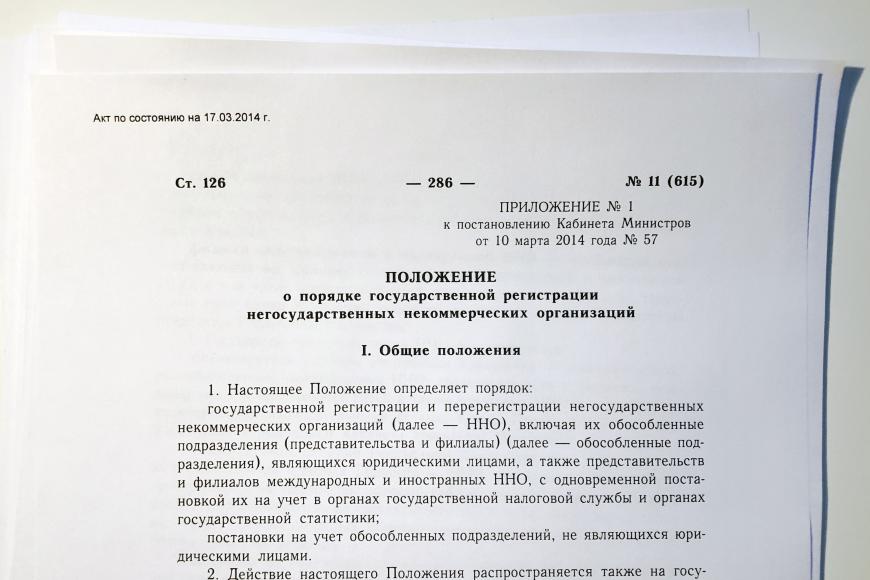
Countries
Solidarity campaigns
Uzbekistan: Registration Barriers for Independent Groups
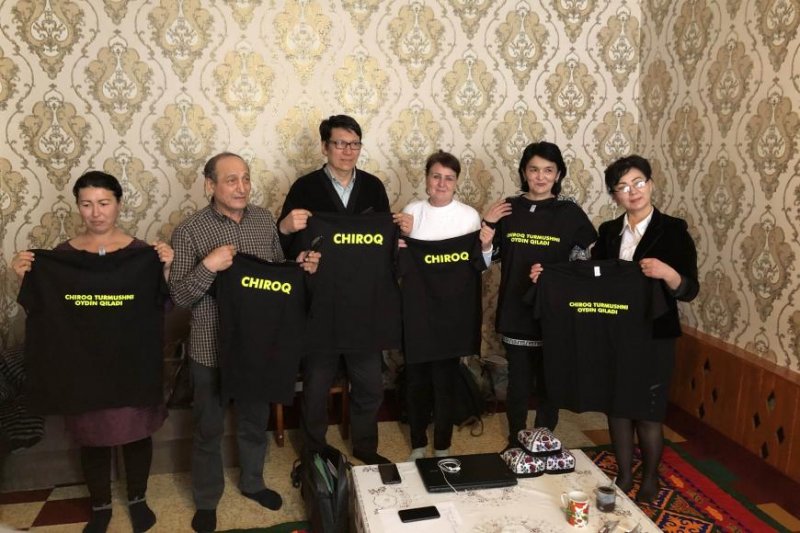
(Berlin) – Uzbek authorities are severely hindering the work of independent nongovernmental organizations (NGOs) with excessive and burdensome registration requirements, violating their right to freedom of association, Human Rights Watch said today.
Uzbekistan has carried out some human rights reforms in recent years under President Shavkat Mirziyoyev. But the government has refused to allow the registration of NGOs that seek to work on sensitive issues such as human rights and forced labor. The Uzbek government should amend its legislation and allow independent groups to register.
“Independent groups face many barriers to registration in Uzbekistan and are not able to play their proper role in society,” said Vladislav Lobanov, assistant Europe and Central Asia researcher at Human Rights Watch. “Uzbekistan’s international partners are urging Tashkent to allow civil society to act freely, and the government needs to respond.”
In April 2020, the United Nations Human Rights Committee expressed concern that “current legislation continues to impose restrictions on the right to freedom of association” and over “the small number of independent self-initiated NGOs registered [in Uzbekistan and], the high number of rejections for registration.”
During its annual human rights dialogue with Uzbekistan in October 2020, the European Union (EU) also expressed concern over registration barriers for nongovernmental groups. In 2019, the US State Department said that the Uzbek government “continued to deny the registration requests submitted by all other domestic groups.”
Human Rights Watch interviewed representatives of six independent groups that have sought registration in recent years. All said that their registration applications had been rejected, often on trivial grounds, and that the clear intent was to prevent their legitimate human rights work. One of the groups was finally allowed to register on its third attempt.
The representatives said their applications had often been rejected for minor alleged mistakes, including grammar or even minor punctuation mistakes, missing information, or the language used in application documents. In many cases, small errors were identified in the second or third application rounds that could have been sorted out in the first round.
“There’s not a single page of the charter left without my corrections to it,” said Shukrat Ganiev, head of the Humanitarian Legal Center. “With each application, the Ministry of Justice found new mistakes. If only they told me directly that they are not in favor of my activities and work, but they don’t say that.”
The legislation includes excessive requirements for registration and an extensive list of reasons for rejection, making decision-making by authorities appear arbitrary. “The authorities do not provide proper consultations on registration,” one activist said.
Several representatives said they believed the country’s powerful security services had ordered the rejection of their application. “The Ministry of Justice officials have privately told us that everything was fine with our documents, but they were still not able to register our organization,” one representative said. “They just touched their shoulders, making a reference to lapels worn by the State Security Service officials.”
The government has taken some important steps to ease the registration process regulated by the 2014 Cabinet of Ministers Decree on the procedure for state registration of nongovernmental nonprofit organizations. These steps include significantly reducing the registration fee, cutting the time period for government review of registration documents from two months to one month, and opening a portal that allows submission of applications by nongovernmental groups online. But vague and burdensome rules remain in place.

In 2018, President Mirziyoyev issued a Presidential Decree on measures to radically increase the role of civil society institutions in the process of democratic renewal of the country. At the time, Mirziyoyev noted that the laws that regulate registration procedures and work of nongovernmental groups “provide for excessive bureaucratic requirements and obstacles that are outdated and do not meet modern demands.”
In October 2019, Mirziyoyev ordered the establishment of a working group to prepare a new code for nongovernmental groups with the aim of streamlining legislation on civil society and ordered the draft to be submitted for review to the Cabinet of Ministers by February 1, 2020. In January 2020, the draft was finalized, but it failed to eliminate the existing restrictions, according to assessments by local civil society experts.
Subsequent deadlines have been missed. As of January 2021, Human Rights Watch was not aware of further steps taken to finalize the draft code and it has not been made available to the public.
In August, two groups of more than 50 representatives of local groups and international experts created two alternative codes and sent them for consideration to the parliament, presidential administration, and the Ministry of Justice, but the government has not responded. The alternative codes propose that registration should not be denied for minor mistakes in application documents and the authorities should help groups to correct any such mistakes within three days.
As a signatory to international human rights treaties Uzbekistan has an obligation to respect and protect freedom of association. In 2020 Uzbekistan was elected to the UN Human Rights Council, for a term that began in January 2021, and it has applied for an enhanced trade status with the EU. In both cases, Uzbekistan’s applications contained commitments to allow civil society to operate freely, but it has failed to act on them.
The UN Committee also recommended that Uzbekistan “bring its regulations and practice governing the registration of political parties and NGOs into full compliance with the provisions of arts. 19, 22 and 25 of the Covenant [International Covenant on Civil and Political Rights]” and “guarantee the involvement and participation of a wide range of civil society actors and experts in the preparation of the new code on nongovernmental non-commercial organizations.”
“President Mirziyoyev made a commitment in 2018 to sweep away restrictions on nongovernmental groups,” Lobanov said. “Uzbekistan should make this change and create an enabling environment for independent groups as a central part of the country’s reform agenda”.
For more details on registration barriers that groups face in Uzbekistan, please see below.
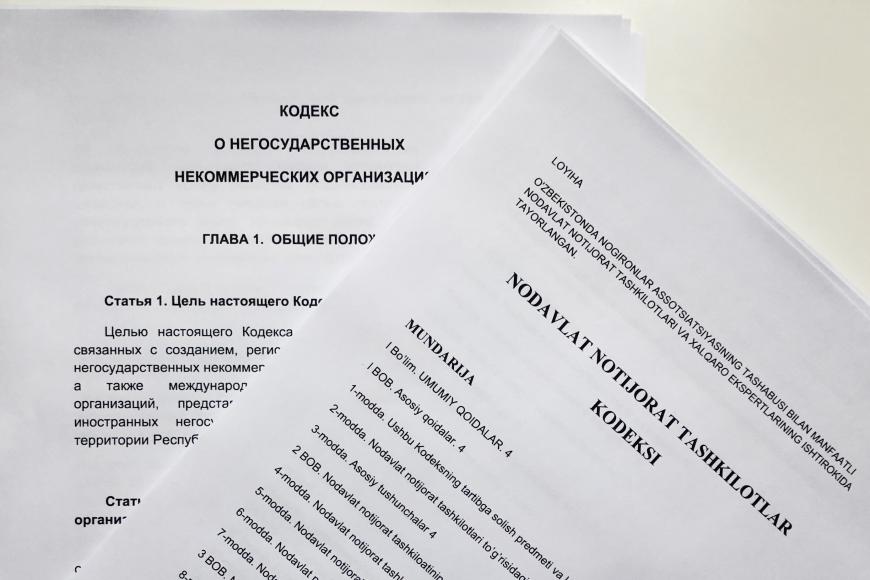
Interviews took place in November 2020 and were conducted remotely in Russian.
Chiroq (“Light”)
Azimbay Ataniyazov, head of Chiroq, tried twice unsuccessfully to register the group with the Justice Ministry of Karakalpakstan, an autonomous region in the north of Uzbekistan, once in January and again in March 2020. The group focuses on forced labor and human rights violations in the region. Ataniyazov is planning to apply a third time.
His first application was rejected “because of grammatical mistakes in the submitted documents.” The second time, the Justice Ministry replied that he had to correct the mistakes and submit all the required documents and signatures of the founding members again, as the Ministry had not returned the initial submission. In rejecting the second application, the Ministry said that Ataniyazov should provide 12 founding members’ signatures, although the law requires 10, which Ataniyazov had provided.
The Ministry also instructed Ataniyazov to remove references from the charter, including “engaging with international and local human rights organizations” and the Universal Declaration of Human Rights and the International Covenant on Civil and Political Rights; and to remove trial monitoring from its list of activities, among other changes. The Ministry also indicated that Ataniyazov failed to confirm the residence of the founding members with the authorities, even though the local Justice Ministry office had told him that as of January 1, 2020 this was not necessary.
On February 1, in Nukus, a city in Karakalpakstan, Ataniyazov, several activists, and the founding members of Chiroq met with five representatives of the Cotton Campaign member organizations, including two staff members of Human Rights Watch. The campaign is a global coalition of human rights, labor, investor, and business organizations dedicated to eradicating forced and child labor in cotton production in Uzbekistan.
Early in the morning, a traffic police officer stopped a human rights defender, Arslanbay Utepov, as he was driving to the meeting. The police took Utepov to the local administration, where the authorities held him until the evening, and warned him not to interact with international human rights organizations. The police officers also stopped Zaripbay Reymov, a member and co-founder of Chiroq, on his way to the meeting. The officers seized his phone and took him to a police station, holding him there until the afternoon. On that day, Chiroq’s founder, Guldana Seidemetova, was urgently ordered to come to a clinic where she works “because a commission from Tashkent was coming,” but no commission arrived.
On January 31, an alleged Interior Ministry employee visited Murat Ubbiniyazov, a human rights activist and Chiroq’s co-founder, and told him that Ataniyazov was a “liar,” “fraudster,” was “providing Uzbekistan’s enemies with false and discrediting information,” and “that Ataniyazov makes fake photos of child labor in the cotton fields and sends them to foreign media outlets.”
After these events, two founding members of Chiroq stepped down.
The Cotton Campaign expressed concern that these actions by the authorities amounted to harassment and intimidation of Chiroq’s members aimed at preventing them from meeting with the Cotton Campaign representatives.
Commenting on the pressure from the authorities, Ataniyazov said:
Humanitarian Legal CenterThey say I’m an enemy of the state and that I’m working for foreign enemies and people should avoid my group.… They register only loyal people and I’m sure they won’t give me registration because they think I’m a radical in the eyes of the authorities.
Shukrat Ganiev, head of the Humanitarian Legal Center in the Bukhara region, said that the group first received registration in 2000 with a mission to promote and do analytical work on democratic reforms. In 2006, the Uzbek authorities forced the organization to shut down, allegedly for “failing to submit reports on time.” This happened shortly after Ganiev had appealed to the authorities on behalf of a group of civil society activists to provide full information on the Uzbek government killing hundreds of largely peaceful protesters in the eastern city of Andijan on May 13, 2005.
Since 2009, Ganiev has been applying for registration and is planning to work on protecting the rights of ethnic and religious minorities, lesbian, gay, bisexual, and transgender (LGBT) rights, women’s rights, and disability rights, among other topics. He said that as of September 2020, he had received seven rejections and was not planning to file another application:
In September 2020, his group was denied registration on the grounds of not indicating the mission of the organization “correctly,” even though he used the same phrasing as in the charter, when the organization was approved for registration in 2000. Ganiev appealed to the Justice Ministry but did not receive a reply. Reasons that his other applications were rejected were given as failing to reflect “protection of human rights” in accordance with the Uzbek legislation, and that not all founding members submitted confirmations on their conscription status, a requirement that, Ganiev said, is not stipulated in the NGO code.All rejections were quite the same ... orthographical mistakes in the charter or I didn’t prepare documents correctly. But it was just a formality. I would go to the local office of the Ministry of Justice and they would tell me in private that they had no other choice [there were other informal reasons], but to deny registration.... Now I will take it to the court.
In August, Ganiev sent a copy of his sixth application to the head of the department responsible for registering organizations in the Justice Ministry in Tashkent, and was told that his application would be closely followed. When Ganiev received the last rejection, he also sent the document to the official:
Restoration of JusticeOne could think that the Ministry of Justice in the capital simply doesn’t know what local authorities do and they are allegedly to be blamed at the local level. This time Tashkent knew about my case very well. But the department’s head never commented on my rejection. The Ministry of Justice is its own government inside Uzbekistan.
Between 2018 and 2019, a group of three former political prisoners, Agzam Turgunov, Azam Farmonov, and Dilmurod Saidov, sought to register a group called Restoration of Justice. The group planned on focusing on criminal justice reform and legal rehabilitation of people who have been wrongfully imprisoned. After four Justice Ministry rejections, the group split into two separate projects: Human Rights House, led by Turgunov, and Huquqi Tayanch (Legal Support), founded by Farmonov and Saidov. The applications to establish Restoration of Justice were rejected on various grounds, such as failing to confirm with the authorities the legal addresses of the group’s founding members; including incorrect information about the group’s legal status in their charter; and other minor mistakes.
Huquqi Tayanch (Legal Support)
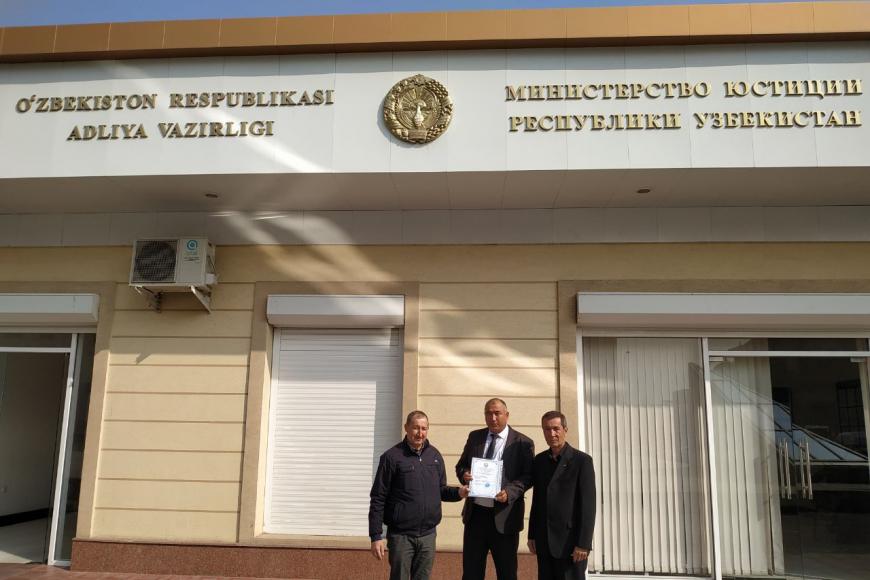
On March 9, 2020, after two rejections in early 2020, Huquqi Tayanch was registered by the Justice Ministry in Tashkent. The group focuses on rehabilitation of political prisoners, torture and ill-treatment, and providing support to prisoners.
Farmonov said that in order to be registered, the group had to correct mistakes in the charter, including changing their status from a “public organization” to “an association,” removing a mention that Huquqi Tayanch could open branches abroad, and also getting “a guarantee letter” from a landlord instead of providing the address of one of the founding members.
When asked about the registration process, Farmonov said:
We have suffered a lot from the whole registration process in the last three years. You have to fight in order to get registration. We’ve been trying to get registration for years, had no status, then we got it and the authorities laughed it off, saying it wasn’t important.
Human Rights House
The Justice Ministry has rejected Human Rights House six times since March. Turgunov is planning to work on monitoring Uzbekistan’s compliance with its international human rights obligations, provide expert opinions, monitor trials, and work on rehabilitation of former prisoners who were unjustly convicted. He is now preparing the seventh registration application. He is planning to take the issue to court if he receives another rejection.
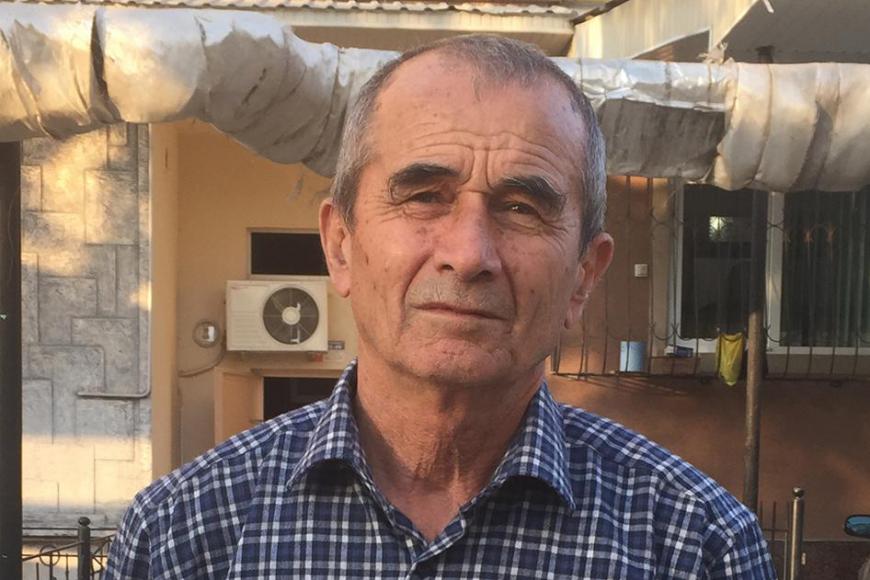
Agzam Turgunov, founder of Human Rights House, 2017. © 2017 Human Rights Watch
Shortly after the most recent rejection, in October, all 11 founding members received visits from State Security Service officials “to verify their identities.”
“It was an attempt to intimidate the founding members,” said Nadejda Atayeva, the head of the Association for Human Rights in Central Asia, who is supporting Turgunov in the registration process. “Their ‘identities’ had already been confirmed in the documents by the authorities [based on their residences] and a notary office.”
She said that Turgunov’s organization was denied registration “for not specifying how its branches will work in other regions, while this was explicitly indicated in the charter, and because the documents were not prepared properly, although this had been done by a notary, and other minor mistakes.”
In August, Turgunov’s fifth registration application, which he had submitted by email, was rejected because “the documents were not prepared as prescribed [as hard copies].” However, “The Ministry of Justice instructed him to do so because of the Covid-19 pandemic and the closure of public institutions,” Atayeva said.
As long as registration documents are resubmitted within three months of a rejection, the fee of approximately US$100 can be waived. When Turgunov submitted the sixth application, the officials told him that the waiver applied. But in the subsequent rejection, the Justice Ministry stated that the fee had not been paid.
On one occasion, Justice Minister Ruslanbek Davletov told Turgunov that “there was no need to get another registration” and that he should join Huquqi Tayanch instead.
“I’m Alive”
“I’m Alive,” which was planning to build and open a shelter for stray animals in the city of Fergana, stopped applying for registration after receiving five rejections from the local office of the Justice Ministry between June and October 2020.
One founding member, who requested anonymity, said that the laws on protection of animals in Uzbekistan are weak and that animal welfare is a sensitive topic for the government.
Between September and November, staff members of Gorkomhoz, a body responsible for city planning and for keeping stray animals, on three occasions, harassed, used excessive force, and seized phones of a founding member from “I’m Alive” and those of several journalists when they visited Gorkomhoz to raise the issue of animal welfare.
The applications from “I’m Alive” were rejected on the grounds that the documents were prepared in the Latin alphabet instead of Cyrillic, there was a problem with the numbering of the pages, and grammatical and orthographical mistakes. The group was also required to present a “guarantee letter” from a landlord that would give “I’m Alive” office space free of charge, because the group was registering as a charitable organization.
The founding member summarized the rejections:
In each application, they found new mistakes. It seemed that with each rejection, they only looked at one page at a time. All mistakes were not stated in the very first rejections. It was like torture. We were devastated. They just simply kicked us back and forth with those rejections. When we complained, the local office of the Ministry of Justice said they bore no responsibility for reviewing documents, it was the head office in Tashkent. When we got the last rejection, we simply did not even bother picking it up. We are not going to take it to court. We are tired of knocking on closed doors and feel powerless.
Oltin Qanot (Golden Wing), Inklyuziv Hayot (Inclusive Life), Sharoit Plus (Conditions Plus)
In October 2020, a group of young activists in Tashkent trying to establish a youth volunteer center, Oltin Qanot, reported that they had received 18 rejections since November 2017, including for failing to submit required documents, or to confirm signatures of founding members, or for ambiguities in the charter.
Dilmurad Yusupov, a doctoral researcher at the Institute of Development Studies, University of Sussex, UK, who has been closely following registration problems of groups in Uzbekistan, told Human Rights Watch that the group plans to work on the same issues as The Union of Youth of Uzbekistan, a group seen by observers as close to the government.
Yusupov said it was possible that the applications were rejected because The Union of Youth of Uzbekistan already plays a dominant role in this field.
In contrast, Yusupov gives the example of Inklyuziv Hayot (Inclusive Life), an organization that works with people with disabilities. Inklyuziv Hayot had 12 rejections and on the 13th attempt received registration in September. He said that there are no other government-organized groups that operate in the same field and it could have been the reason why it was registered.
Yusupov said:
The authorities do not trust NGOs.… We would like to do something good for the society, but they don’t understand that concept … In our culture, mentality, it is not a common thing to give support without asking for money or having selfish goals.
Yusupov is also one of the founding members of Sharoit Plus (Conditions Plus), which provides support to people with disabilities. Between 2014 and 2016, his organization received eight rejections of registration on the grounds of mistakes in the charter. After President Mirziyoyev assumed power, he wrote to the Virtual Office of the President in September 2016. In October 2016, the group was invited to the Justice Ministry and told that they could get registration. The organization received registration in December 2016. Yusupov said that political will and the effectiveness of the Virtual Office, in particular, between 2016 and 2017, played a key role in the registration of Sharoit Plus.
“If you look at our charter now, you could still find grammatical mistakes,” Yusupov said. “Therefore, such minor mistakes should not be a barrier.”
Source: HRW
